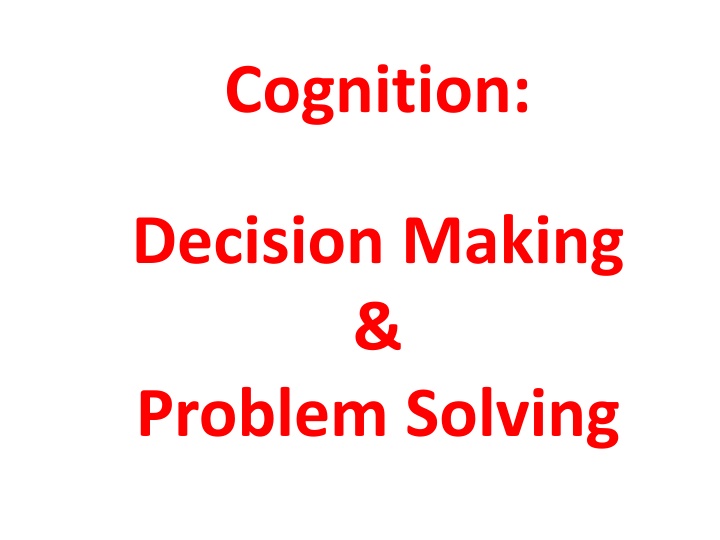
Decision Making, Problem Solving, and Cognitive Biases
Explore the influences on decision making such as loss aversion and the framing effect, along with the challenges of problem-solving like ill-defined and well-defined problems. Uncover cognitive biases like functional fixedness and mental set that impact problem-solving processes.
Download Presentation

Please find below an Image/Link to download the presentation.
The content on the website is provided AS IS for your information and personal use only. It may not be sold, licensed, or shared on other websites without obtaining consent from the author. If you encounter any issues during the download, it is possible that the publisher has removed the file from their server.
You are allowed to download the files provided on this website for personal or commercial use, subject to the condition that they are used lawfully. All files are the property of their respective owners.
The content on the website is provided AS IS for your information and personal use only. It may not be sold, licensed, or shared on other websites without obtaining consent from the author.
E N D
Presentation Transcript
Cognition: Decision Making & Problem Solving
http://en.wikipedia.org/wiki/Framing_effect_(psychology) Influences on Decision Making Framing a cognitive bias, in which people react differently to a particular choice depending on whether it is presented as a loss or as a gain. Framing Outcome Option A: Positive "Saves 200 lives" Option B: Negative "400 people will die" Tversky & Kahneman, 1981
http://en.wikipedia.org/wiki/Loss_aversion Influences on Decision Making Loss Aversion - The tendency to strongly prefer avoiding losses to acquiring gains. Decision makers often weigh losses more heavily than gains. Informally the loss of $500 generates a bigger change in subjective well-being than does a $500 gain. Discussion Question How might loss aversion have arisen in a universe characterized by the law of entropy (i.e., the 2nd law of thermodynamics)? https://en.wikipedia.org/wiki/Second_law_of_thermodynamics
Problem Solving Ill-Defined Problems a challenge in which the goal and/or intermediate steps are poorly specified. Examples: Publishing a research article in a prestigious journal. Creating a computerized device. Achieving peace in a conflict-ridden region. Responding effectively to natural disasters.
http://en.wikipedia.org/wiki/File:9dots.svg Problem Solving Well Defined Problem a challenge in which the goal and intermediate steps are clearly specified. Link all 9 dots using four straight lines or fewer, without lifting the pen and without tracing the same line more than once.
Obstacles to Problem Solving Mental Set the tendency to approach a problem in a particular way . http://en.wikipedia.org/wiki/Set_(psychology) Functional Fixedness a cognitive bias that limits a person to using an object only in the way it is traditionally used . http://en.wikipedia.org/wiki/Functional_fixedness
http://en.wikipedia.org/wiki/File:Genimage.jpg Functional Fixedness
https://commons.wikimedia.org/wiki/Category:Stomach_cancer#/media/File:Skrand%C5%BEio_v%C4%97%C5%BEys.gifhttps://commons.wikimedia.org/wiki/Category:Stomach_cancer#/media/File:Skrand%C5%BEio_v%C4%97%C5%BEys.gif Strategies to Improve Problem Solving Example Problem How to use radiation to eliminate a tumor w/o harming surrounding tissue? Gick & Holyoak (1980) Cognitive Psychology, 12, 306-355. Gick & Holyoak (1983) Cognitive Psychology, 15, 1-38.
http://en.wikipedia.org/wiki/File:Bodiam-castle-10My8-1197.jpghttp://en.wikipedia.org/wiki/File:Bodiam-castle-10My8-1197.jpg Strategies to Improve Problem Solving One problem-solving strategy entails finding a relevant analogy, and applying it to the current problem. Gick & Holyoak (1980) Cognitive Psychology, 12, 306-355. Gick & Holyoak (1983) Cognitive Psychology, 15, 1-38.
